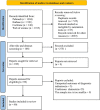The relationship of domestic pet ownership with the risk of childhood asthma: A systematic review and meta-analysis
- PMID: 35935350
- PMCID: PMC9352935
- DOI: 10.3389/fped.2022.953330
The relationship of domestic pet ownership with the risk of childhood asthma: A systematic review and meta-analysis
Abstract
Background and objective: The relationship between pet ownership and childhood asthma remains controversial. In recent years, there have been increasing studies with large sample size. Therefore, we conducted this systematic review and meta-analysis to evaluate the relationship between pet ownership and childhood asthma.
Method: Relevant research was retrieved from PubMed, Cochrane, EMBASE, and Web of science. The retrieval was as of October 1, 2021. The Newcastle-Ottawa Scale (NOS) was used to assess the quality of the included studies. Stata 15.0 was used to conduct the meta-analysis.
Results: A total of 60 studies with large sample size published between 1995 and 2021 were included in this systematic review and meta-analysis, which included 18 cohort studies and 42 case-control studies covering 27 countries and 1,871,295 children. As shown by meta-analysis results, cat ownership (OR = 1.18, 95%CI: 1.05∼1.33) and dog ownership (OR = 1.12, 95%CI: 1.0 0∼1.24) have a significant bearing on the occurrence of childhood asthma. Pet ownership was also positively correlated with the occurrence of severe childhood asthma (OR = 1.15, 95%CI: 1.11∼1.20).
Conclusion: Pet ownership, especially cats and dogs, is associated with the occurrence of asthma in children.
Keywords: asthma; cat; childhood; dog; domestic; meta-analysis; pet ownership; severe.
Copyright © 2022 Ji, Yao, Zheng and Hao.
Conflict of interest statement
The authors declare that the research was conducted in the absence of any commercial or financial relationships that could be construed as a potential conflict of interest.
Figures






Similar articles
-
Relationship between maternal folic acid supplementation during pregnancy and risk of childhood asthma: Systematic review and dose-response meta-analysis.Front Pediatr. 2022 Nov 17;10:1000532. doi: 10.3389/fped.2022.1000532. eCollection 2022. Front Pediatr. 2022. PMID: 36467483 Free PMC article. Review.
-
Does pet ownership in infancy lead to asthma or allergy at school age? Pooled analysis of individual participant data from 11 European birth cohorts.PLoS One. 2012;7(8):e43214. doi: 10.1371/journal.pone.0043214. Epub 2012 Aug 29. PLoS One. 2012. PMID: 22952649 Free PMC article.
-
Effect of Exposure to Cats and Dogs on the Risk of Asthma and Allergic Rhinitis: A Systematic Review and Meta-analysis.Am J Rhinol Allergy. 2020 Sep;34(5):703-714. doi: 10.1177/1945892420932487. Epub 2020 Jun 20. Am J Rhinol Allergy. 2020. PMID: 32564683
-
Effects of early cat or dog ownership on sensitisation and asthma in a high-risk cohort without disease-related modification of exposure.Paediatr Perinat Epidemiol. 2010 Mar;24(2):171-8. doi: 10.1111/j.1365-3016.2010.01095.x. Paediatr Perinat Epidemiol. 2010. PMID: 20415774
-
Asthma and sensitization in a community with low indoor allergen levels and low pet-keeping frequency.J Allergy Clin Immunol. 2004 Dec;114(6):1389-94. doi: 10.1016/j.jaci.2004.09.005. J Allergy Clin Immunol. 2004. PMID: 15577842
Cited by
-
A microbial symphony: a literature review of the factors that orchestrate the colonization dynamics of the human colonic microbiome during infancy and implications for future health.Microbiome Res Rep. 2024 Sep 24;4(1):1. doi: 10.20517/mrr.2024.32. eCollection 2025. Microbiome Res Rep. 2024. PMID: 40207275 Free PMC article. Review.
-
Perception of Illness and Fear of Inhaled Corticosteroid Use among Parents of Children with Asthma.Children (Basel). 2023 Sep 25;10(10):1597. doi: 10.3390/children10101597. Children (Basel). 2023. PMID: 37892260 Free PMC article.
-
Quality of life, sleep, and psychological well-being in chronic spontaneous urticaria patients receiving omalizumab: a case-control study.Arch Dermatol Res. 2025 Apr 17;317(1):715. doi: 10.1007/s00403-025-04231-w. Arch Dermatol Res. 2025. PMID: 40244437
-
Dog-ownership and paediatric neurodevelopmental disorders; 'pawsitive' impact: a systematic review.Pediatr Res. 2025 Jul 30. doi: 10.1038/s41390-025-04206-7. Online ahead of print. Pediatr Res. 2025. PMID: 40739385
References
Publication types
LinkOut - more resources
Full Text Sources
Research Materials
Miscellaneous

